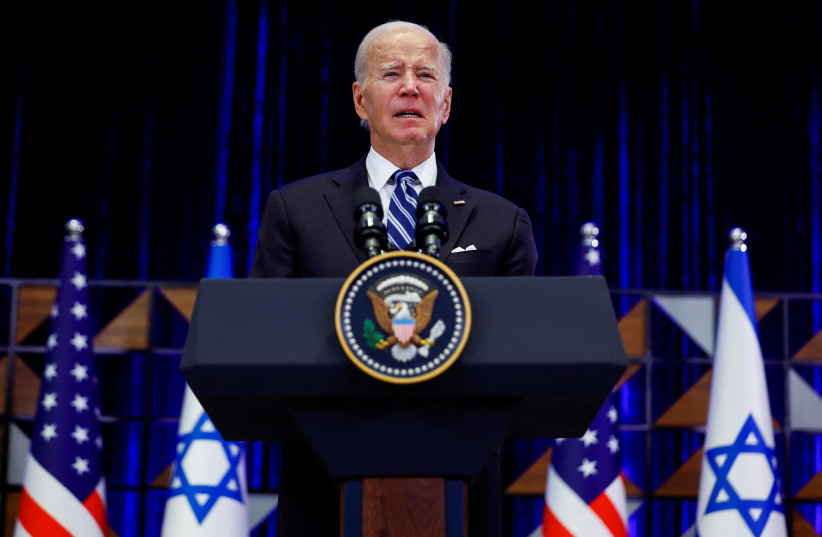French President Emmanuel Macron is scheduled to arrive in Israel on Tuesday, the latest in a line of world leaders who have come here to show solidarity since the October 7 massacres.
The list includes the leaders of Romania, Germany, the US, Britain, Italy, Cyprus, the Netherlands, and Greece.
While the visit last week by US President Joe Biden was obviously the most important, the visits of these other leaders have significance in that these visits themselves, the very act of coming here now during a time of war, is on its own seen as a show of solidarity that undoubtedly has an impact on public opinion in each of those countries.
This makes Macron’s visit particularly interesting because France has a substantial Muslim population and a vocal far-left that strongly supports the Palestinians. His visit was preceded in Paris on Sunday night by a sizeable pro-Palestinian protest, and there was a lively debate in the National Assembly about the crisis on Monday afternoon.
Israel enjoyed broad support in France’s National Assembly following the October 7 massacres, with the exception of the far-left France Unbowed party of Jean-Luc Melenchon, which refuses to refer to Hamas as a terrorist organization, instead calling it a resistance group. That party’s failure to condemn Hamas is causing friction with the mainstream French left-wing parties – the Greens and the Socialists.
On his visit here, Macron is expected to add his voice to those calling for Israel to abide by international law in waging this war and do what it can to minimize civilian casualties.

There is something patronizing about these calls – as if Israel needs to be reminded by the world to abide by international law and to not harm civilians. Everyone from Biden down to Macron knows Israel does its best to avoid civilian casualties. Their public calls on this matter are as much for their domestic consumption as they are for the ears of Israeli leaders. It allows them to defend their diplomatic support for Israel by saying they also urged the Israelis not to harm civilians.
While officials in Jerusalem are not sure what Macron hopes to accomplish during his visit, there are a couple issues his visit is meant to address.
What is Macron trying to address?
The first is an unequivocal condemnation of Islamic terror, something which is also proving a scrounge in France. On October 13, a school teacher was stabbed to death by an Islamic radical in northern France almost three years to the day since another teacher was beheaded by a terrorist because he showed caricatures of Mohammed.
The French have felt Islamic fanaticism, and by coming here, Macron is sending a signal back home that he will not sit quietly in its wake.
Furthermore, Macron is coming here full of concern for the situation in Lebanon, a country with which France has strong historical links.
Although Macron has some influence over the Christian and Sunni populations in Lebanon, and a bit of Influence over the Druze, it carries little sway with the Shia community, represented by Hezbollah. Nevertheless, the French public expects him to become involved in a crisis when Lebanon is concerned.
France also has vital interests in the Maghreb – Algeria, Tunisia, and Morocco – where public sentiment against Israel is at a fever pitch. Comments that he will likely make in Israel about easing the humanitarian crisis in Gaza and calling on Israel not to harm civilians are meant to play in those countries, as well as in France.
Unlike the US, which now has considerable leverage over Israel because of all the support – both moral and material – it is showing; and unlike Germany, with which Israel has a long-standing security relationship; and unlike the British, who dispatched surveillance aircraft and two Royal Navy support ships to the Eastern Mediterranean as a show of support, France really has no leverage in Jerusalem.
So why is Macron coming? Because to not come now, even though all those other leaders did, would send a message that Europe is divided on this matter between the Anglo-German axis and a French-Spanish one (no one is expecting the Spanish prime minister to come to show his support, any more than one would expect the prime minister of Ireland to do the same).
Macron’s visit also does something else: it sends a calming message to France’s Jewish community that the Republic stands with them. This is a community that has suffered from Islamic terrorism in the recent pass, and it is reassuring for them to see the French president in Israel taking a strong stand against that type of terror.
